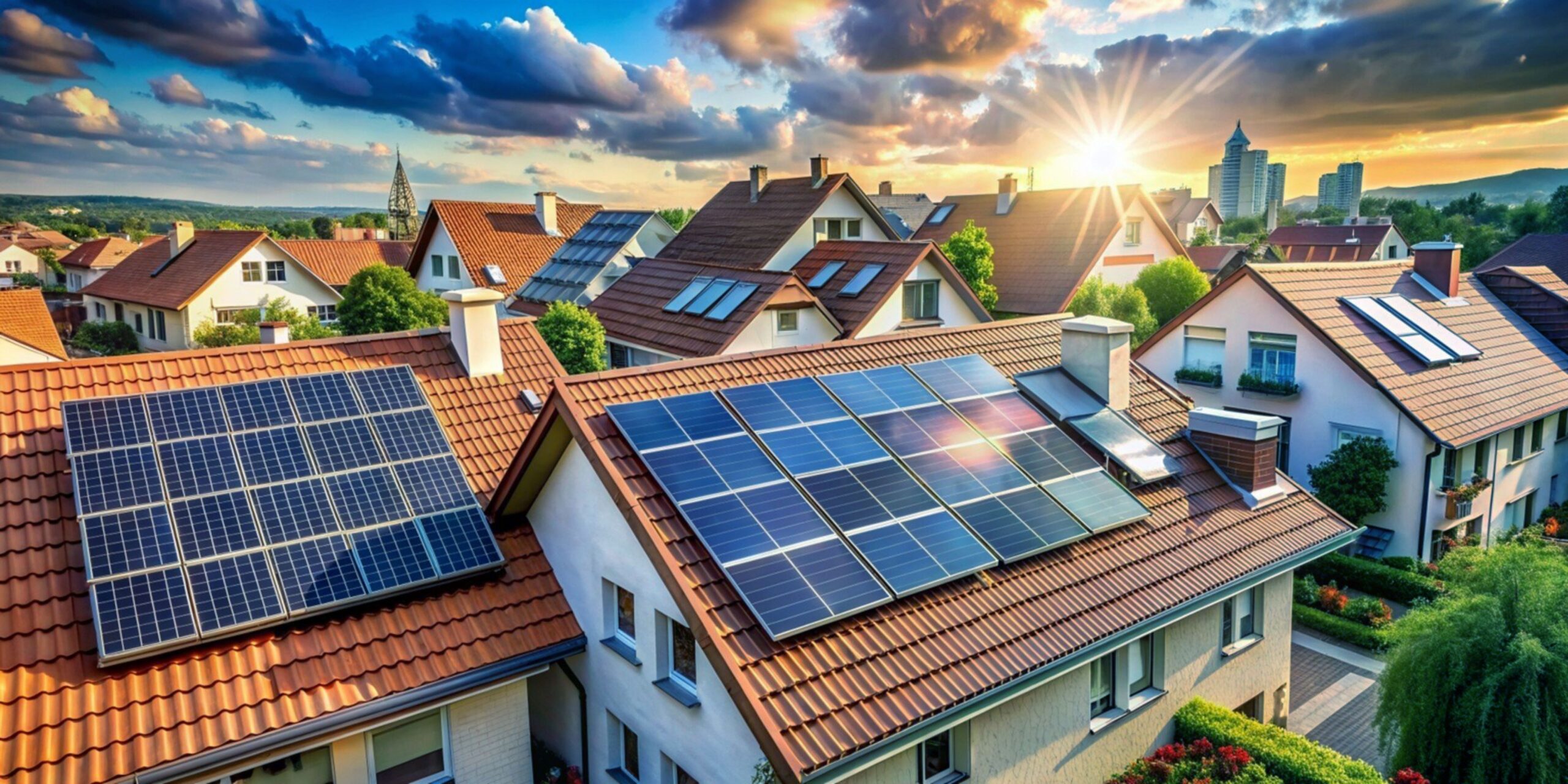As solar energy gains popularity, more homeowners are switching to home solar systems.
These systems offer numerous benefits, such as energy independence, lower electricity bills,
and increased home value. However, many newcomers to solar may not be aware of these
advantages.
In this beginner’s guide, we cover the basics of home solar systems, their overall benefits,
different types, the installation process, and more. Read on to discover everything you need
to know about going solar.
What Is a Home Solar System?
A home solar system, also known as residential solar, converts sunlight into usable energy for
homes. It consists of solar panels, inverter(s), and an optional battery, and connects to the
main power grid.
Solar panels are the core of a home solar system, absorbing sunlight through photovoltaic
(PV) cells and converting it into direct current (DC) electricity. This DC electricity then passes
through the inverter, which converts it to alternating current (AC) electricity needed to power
homes and appliances.
Benefits of Home Solar Systems
Home solar systems have become more affordable in recent years, making them more
accessible to homeowners. Here are some key benefits of switching to solar energy:
- Affordable Solar Panels
Advances in solar technology and increased production have significantly reduced the cost
of manufacturing and installing solar panels. Additionally, various financial programs help
offset the cost of solar installation.
- Save Money
One of the main attractions of home solar systems is the potential for long-term savings. By
generating their own energy, homeowners reduce their reliance on grid electricity, leading to
lower utility bills. Over time, these savings can add up significantly.
- Backup Power During Outages
Power outages can occur due to extreme weather, emergencies, or high demand. A home
solar system with a backup battery can provide power during these outages. Excess energy
generated by solar panels is stored in the battery for later use, keeping the lights and
appliances on even when the grid is down.
- Increased Home ValueHomes with solar systems tend to sell faster and at higher prices. Prospective buyers
appreciate the environmental and financial benefits of solar energy, making homes with solar
panels more attractive in the real estate market.
- Effective in Various Climates
Solar panels can generate energy in a range of weather conditions, including cloudy, rainy, or
snowy days. While they are most efficient in sunny climates, modern solar panels are designed
to capture and convert sunlight effectively, making them suitable for various climates.
Types of Home Solar Systems
Homeowners can choose from three types of home solar systems: grid-tied, off-grid, and
hybrid. Here’s how each one works:
Grid-Tied
Grid-tied systems are the most common, connecting to the local power grid. Homeowners
can use solar energy they produce and rely on grid electricity as needed. These systems also
allow for net metering, where excess energy is sold back to the grid for credits on utility bills.
Off-Grid
Off-grid systems operate independently from the utility grid, ideal for remote areas. They
require a solar battery to store excess energy for use during low sunlight periods.
Hybrid
Hybrid systems combine features of both grid-tied and off-grid systems. They connect to the
grid and use a backup battery, offering flexibility and energy independence.
Solar Incentives and Tax Credits
Various rebates, incentives, and tax credits are available to reduce the cost of installing home
solar systems. Here are two popular programs:
l Federal Solar Tax Credit: Allows homeowners to claim 30% of their solar installation costs
on federal income taxes.
l Net Metering: Some state and local governments offer programs that let homeowners
sell unused energy back to the grid for credits on their electricity bills.
Homeowners should research available programs in their area, as some have strict end dates.
Choosing Solar Panels
When selecting solar panels, consider these factors:
CostInstallation costs vary based on location, number of panels, and the solar company. Get
several quotes to find a balance between cost and quality.
Warranty
Look for warranties covering performance issues and manufacturing defects, typically lasting
20-25 years.
Efficiency
Higher-efficiency panels convert more sunlight into usable electricity. Consult with a solar
installation company to choose the best panels for your home.
Determining the Number of Solar Panels
The number of solar panels needed depends on energy consumption, roof space, and panel
efficiency. Here are rough estimates based on average home size:
1,500 sq. ft.: 18-24 panels
2,000 sq. ft.: 24-32 panels
2,500 sq. ft.: 30-40 panels
These numbers are general estimates; consult a professional solar company for a detailed
design quote.
Home Solar Installation Process
Home solar installation involves several steps:
Assessment
The installation team assesses the property’s solar potential, including roof orientation,
shading, and structural integrity.
Spacing
Proper spacing ensures optimal sunlight exposure. The ideal layout is planned for maximum
efficiency and compliance with building codes.
Drilling
Holes are drilled into the roof to secure the mounting system, with care taken to prevent
damage and maintain roof integrity.
Mounting
The mounting system is installed to provide a sturdy foundation for the panels.
Fastening
Solar panels are securely fastened to the mounts, ensuring they withstand various weather conditions.
Connecting
Panels are connected to the inverter(s) and the home electrical system, enabling the use of
solar energy alongside grid electricity.
Maintaining a Home Solar System
Solar panels require minimal maintenance, but regular inspections and basic upkeep can
maximize performance and longevity. Here are some maintenance tips:
Clean Panels
Clean panels every few months to remove debris. Use lukewarm water and a soft cloth, or
hire a professional for safe cleaning.
Professional Inspections
Schedule annual inspections to identify maintenance or repair issues and ensure optimal
system performance.
Monitor System Status
Use a monitoring app like Q.HOME Energy Management System to track energy usage and
system performance in real-time.
Contact Us
Investing in a home solar system offers numerous benefits. If you have questions about solar
installation or our top-performing solar panels, contact us. At AMPS, we are committed to
providing high-quality products and exceptional customer service to help homeowners
embrace solar energy and maximize their investment.
Contact us today to learn more.






Leave a comment